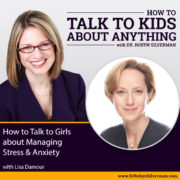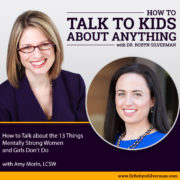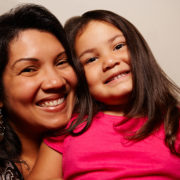 I was recently on the Today Show talking about Discovery Girls and their misstep in publishing an article on swimsuits for specific body types. Some people thought it was a big deal– others did not. What’s your view?
I was recently on the Today Show talking about Discovery Girls and their misstep in publishing an article on swimsuits for specific body types. Some people thought it was a big deal– others did not. What’s your view?
What are the girls experiencing in preteen years that makes this a tough time?
During the preteen years, a girl’s body is changing, her brain is changing and she is moving from the child stage to the teen and young adult stage. It can feel weird and confusing for any girl—so many turn to communities and resources where they feel safe and valued for who they are.
Why is this article a big deal?
This is the time of year when every magazine is focusing on bathing suits and what cuts are best to accentuate their best features and hide features that are less valued in our culture. When preteen magazines jump on the bandwagon, it sends a message to girls that they need to be thinking about how they look—form over function- when it comes to swim suit.
Of course, teen magazines could have a lot of fun with bathing suit styles by flipping the conversation and asking; “What bathing suit style is best for what you LOVE to do” or “What bathing suit patterns reflect your personality?” And going into bold or subtle prints, loud and soft colors and other fun fashion topics like that.
Why was that one sentence in the apology about the magazine attempting to simply “build confidence in girls” a big deal?
Many parents don’t want their girls to get the message that what you wear and how you look affects whether you feel confident. We all make mistakes, absolutely, and I think parents just wanted to hear that a mistake was made, they take full responsibility and it will never happen again.
How do you build a girl’s confidence?
A girl can build confidence by (1) gaining mastery in something she cares about and (2) feeling connected, safe and valued by people she cares about in and outside of her home. When a girl believes in herself, pushes through barriers, succeeds after failing and feels she has key people to rely on in her life, she gains confidence. Confidence is built from the inside out, not the other way around.
Kinds of message this article can inadvertently send:
This kind of an article can send a negative message to a girl who is using the magazine as a safe place to learn how to be a healthy preteen. When we talk about the need to hide areas of our bodies to look good in a swimsuit, we are saying that there are parts of every girl’s body that may need to be covered because it’s not acceptable.
Let’s be blunt. Raising a girl in today’s appearance-oriented world can be a challenge. When articles seem to reflect rather than deflect the media messages plaguing our girls that state “your value comes from how you look or you need to change the way you look to fit what others think is valuable,” parents get very upset. This is especially true when they trust the resource and feel that the focus took an unexpected turn.
What did you think of the article?





 It was 1996, my Freshman year of college, when I came face-to-face with a truth that still follows me today- one unifying concern that almost all girls and women seem to share is that they want to change something about their bodies. I still remember when it happened, as it came as a surprise to me. One of my friends asked me if my thighs touched. This gifted young woman, with big brown eyes, a sharp brain and warm heart worried that how close her thighs were to the other cancelled out her talents, intelligence and overall value.
It was 1996, my Freshman year of college, when I came face-to-face with a truth that still follows me today- one unifying concern that almost all girls and women seem to share is that they want to change something about their bodies. I still remember when it happened, as it came as a surprise to me. One of my friends asked me if my thighs touched. This gifted young woman, with big brown eyes, a sharp brain and warm heart worried that how close her thighs were to the other cancelled out her talents, intelligence and overall value.

 So many of my best “body image” conversations with my daughter happen in the bathroom while we are getting ready for bed. It is where I’ve gotten the question;
So many of my best “body image” conversations with my daughter happen in the bathroom while we are getting ready for bed. It is where I’ve gotten the question; 

 I was recently on the Today Show talking about Discovery Girls and their misstep in publishing an article on swimsuits for specific body types. Some people thought it was a big deal– others did not. What’s your view?
I was recently on the Today Show talking about Discovery Girls and their misstep in publishing an article on swimsuits for specific body types. Some people thought it was a big deal– others did not. What’s your view?
 How do you know if your child may have an eating disorder? Here are some signs that may indicate a problem.
How do you know if your child may have an eating disorder? Here are some signs that may indicate a problem.

 Women (and many men too) are notorious for aiming for perfect. Whether it’s in parenthood, the workplace, our looks or the overall appearance that we have it all together, imperfections are painted over with a broad brush.
Women (and many men too) are notorious for aiming for perfect. Whether it’s in parenthood, the workplace, our looks or the overall appearance that we have it all together, imperfections are painted over with a broad brush.
 My daughter is rounding the corner to age seven in February and if there is one thing I’ve discovered in the time that I’ve been her mother, it’s that all “big talks” are really just a series of small conversations about big issues. Body image is no exception.
My daughter is rounding the corner to age seven in February and if there is one thing I’ve discovered in the time that I’ve been her mother, it’s that all “big talks” are really just a series of small conversations about big issues. Body image is no exception.
 We all get that feeling that we are messing up our children sometimes. I do too. Often…if I’m being honest.
We all get that feeling that we are messing up our children sometimes. I do too. Often…if I’m being honest.